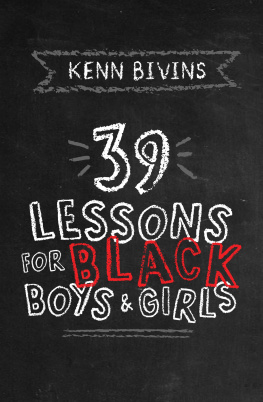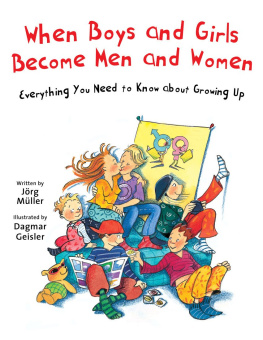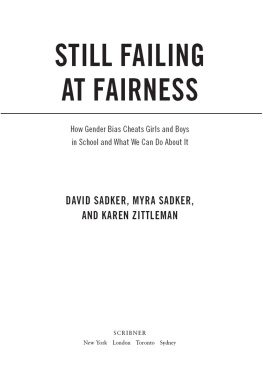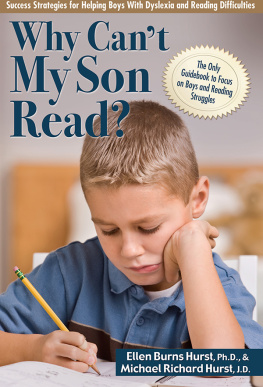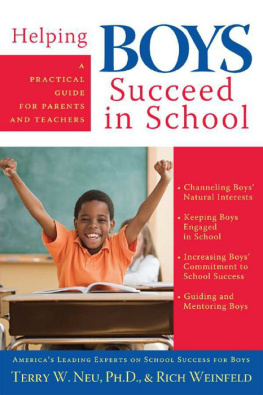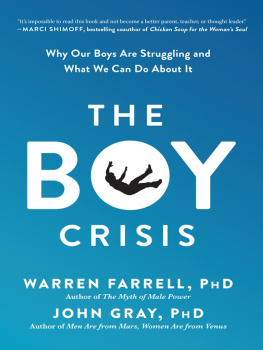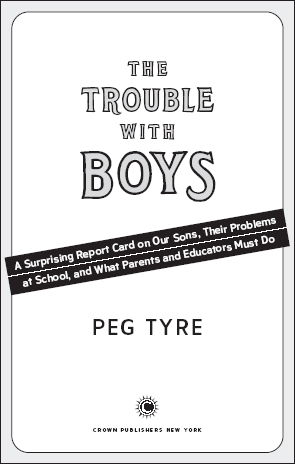INTRODUCTION

The Trouble with Boys
T rina Furgerson, who lives in Bucks County, Pennsylvania, was sitting on a small wooden chair listening to a first-grade teacher complain about her son Chance when it began to dawn on her that school has changed in a way thats bad for boys. The thought startled her. The Furgersonsshes a Pilates instructor and her husband is a software engineerconsider themselves strong supporters of education and big fans of their local school. Nonetheless, Chances teacher had a laundry list of complaints: Chance never came to circle time when he was called; he needed to be asked at least twice. He frequently spoke without raising his hand. He didnt like to write for very long. He often asked when the class was going to get recess. Sometimes, he went to the bathroom without permission. During art, he used his plastic safety scissors to cut his own bangs. Worst of all, the teacher said, Chance didnt always pay attention. Hes never antisocial or aggressive and none of the things that are driving her crazy seemed that big of a deal, Trina thought to herself. But the teacher was finding so many things wrong with her son that Trina, the mother of two, felt cowed and stayed quiet.
The teacher had a suggestion about how to deal with Chances problems. When Chance did something wrong at school, shed make him put a sticker on a chart and recite his misdeed aloud. Then the teacher would write out a description of Chances misdemeanor and give the note to him to take home for Trina to sign. Not knowing what else to doand not wanting to seem uncooperative or resistantTrina agreed to give it a try.
About three weeks later, when Trina met Chances bus, she realized that she had made a terrible mistake. As soon as her six-year-old son felt her arms around him, he collapsed on the ground, convulsed in sobs. He showed her the list of misdeeds the teacher had written out. Mommy, he cried, I just cant be good!
At that moment, Trina realized that it was her six-year-old son, Chance, not the school, who needed her support.
I realized, deep inside of me, that something was very wrongbut not with Chance. The teacher didnt have bad intentions, but I had allowed her to make my son the problem when really the standards of the school were unrealistic. It was, she recalls, one of her very worst moments in parenting. As she dried her sons tears, she vowed to find a better way for him.
Maybe you have a son like Chancea smart, capable boyor maybe a teenager, who is starting to struggle in school. Possibly, youve had a wake-up call like Trina or are experiencing something that is less dramatic but equally troubling: a growing sense that your school-age son is falling out of love with learning. When he talks about his classroom experience, youve begun to notice that he seems fearful, bored, or frustrated. Or maybe you see ways in which hes disengaged from the classroom altogether. Perhaps youve begun to see small but persistent signs that its gotten harder to be a schoolboy than you remember.
It turns out that more parents than you can possibly imagine are noticing the same things. For a variety of reasons, some obvious and some very subtle, a great many boys from all walks of life and every community are not thriving in school. Although your sons trouble may be setting off fireworks in your household, for the most part our schools, our communities, and our elected leaders are ignoring boys widespread underachievement. Yet even as some folks turn a blind eye to the problem, the way boys struggle in school has begun to set off a cascade of effects large and small that are likely to change the fabric of our communities for generations.

Rethinking Ophelia

SURPRISED? I know I was. For the last seven years, I was a staff writer at Newsweek magazine covering social trends and education. In my job, I got to spend a lot of time in schools talking to teachers, principals, parents, and students of all ages. For several years, I didnt see what was in front of my face: the myriad ways in which boys are not thriving in the classroom. In my defense, its not always easy to pick up on a national trend. Schools reflect the communities they serve, and no one kid, one class, one school, or even one district or state can reflect the colorful and chaotic mosaic that makes up the education system in the United States. Plus, I wasnt looking for it. As a grateful beneficiary of the feminist movement, I was steeped in literature about the lives and struggles of girls. I knew that poor African American boys had been lagging far behind most other demographic groups for decades. But books like Mary Bray Piphers Reviving Ophelia: Saving the Selves of Adolescent Girls and Carol Gilligans seminal work In a Different Voice: Psychological Theory and Womens Development were front and center in my consciousness. Those authors had alerted me to the perilous passage all girls traverse as they move toward womanhood. Id read research promoted by the well-respected American Association of University Women that purported to show how boys dominate classrooms at the expense of girls. As a journalist, I try to stay aware of my own inevitable biases, but I was focused on the girls. And I wasnt the only one. I know many smart, sensitive teachers and wonderful principals who take special pains to ensure that their female students get a chance to shine. They are only too aware of the struggles women face in the work world. Those teachers are committed to creating a level playing field for girls in the 50 minutes or so of the world they control.
Im also the mother of two school-age boys. Im sure that most mothers of sons will understand me when I say that raising boys is an adventure. Even though I was raised with two brothers, having sons has given me a passport into a world that is sometimes dramatically different from my own. Ive been amused and sometimes astonished at just how far Mars can be from Venus. My husband and I have been lucky. There have been a few bumps along the way, but for the most part, our sons are doing pretty well. But seeing their experiences, and the experiences of their friends, I began to realize that lots of intelligent boys from good, loving homes are poorly equipped to handle some of the things that schools are demanding of them. Behind their facades of indifference, they often feel a particularly acute form of painthe kind that comes from knowing that youre not measuring up.
My aha moment, if you will, came when I was interviewing the headmaster at a prestigious New York private schoolthe kind that charges $26,000 a year. He was fretting about the lowest-performing students in his middle and high school. He had a real problem, he confided. All of the students in his school had the potential to be high achieversthe admissions office at this particular institution is notoriously selective. Still, students who fell into the lower quartile for grades tended to remain there until graduation. That wasnt a huge problem in itself. Even if you are educating the cream of the crop, every class is still going to have a bottom quartile. The trouble was that the lowest-performing kids were also unconnected from the rich extracurricular life of the school. Some were behavior problems. Others were simply checked out.




